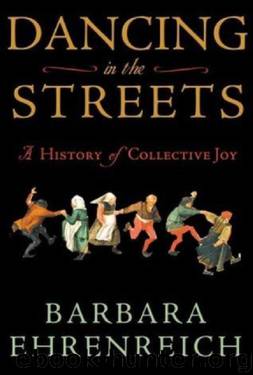Dancing in the Streets by Barbara Ehrenreich

Author:Barbara Ehrenreich [Ehrenreich, Barbara]
Language: eng
Format: epub
Publisher: Henry Holt and Co.
Published: 2011-03-17T17:00:00+00:00
Q. What did God make you for?
A. To make a crop.
Q. What is the meaning of “Thou shalt not commit adultery”?
A. To serve our heavenly father, and our earthly master, obey our overseer, and not steal anything.31
In some instances, secular authorities irritated missionaries by failing to suppress “heathen” collective rites with sufficient consistency and vigor: In Jamaica and Brazil, slave owners often permitted nocturnal dancing on the grounds that it kept the slaves content and, given its evident “lasciviousness,” possibly encouraged them to reproduce.32 In India, English colonial administrators initially opposed the entry of Christian missionaries, fearing that any challenge to Hinduism would threaten stability and hence imperial profits.33
But what is striking, in any overview of colonialism as a global enterprise, is the degree of concordance between conquerors and missionaries, between those who would exploit non-European peoples, their habitats, and their resources, and those who would “merely” destroy their cultures.34 “Imperialism is a matter of religion,” argued the English promoter of the missionary effort. “We need a Christian imperialism and a Christian commercialism. We also need an imperial Christianity and an economic religion.”35 Slave owners and colonial administrators may have cared little what gods, if any, their slaves and subjects worshipped, but they shuddered at the collective strength such rituals invoked and represented. Dance was “particularly distasteful to the Europeans, not only for its ‘salacious[ness],’” Comaroff writes, but because of the sheer “vitality of the system it represented,” a vitality that directly defied the aims of the white exploiters.36 And while individual missionaries may have had little concern for the profits of their fellow countrymen, they shared their dismay at the group unity so powerfully embodied in native ritual. John Mackenzie, sent to southern Africa by the London Missionary Society, wrote enthusiastically of “weakening the communistic relations of members of a tribe among one another and letting in the fresh, stimulating breath of healthy individualistic competition.’”37m
Download
This site does not store any files on its server. We only index and link to content provided by other sites. Please contact the content providers to delete copyright contents if any and email us, we'll remove relevant links or contents immediately.
Cecilia; Or, Memoirs of an Heiress — Volume 1 by Fanny Burney(31326)
Cecilia; Or, Memoirs of an Heiress — Volume 3 by Fanny Burney(30929)
Cecilia; Or, Memoirs of an Heiress — Volume 2 by Fanny Burney(30886)
The Great Music City by Andrea Baker(21197)
We're Going to Need More Wine by Gabrielle Union(18067)
Bombshells: Glamour Girls of a Lifetime by Sullivan Steve(13102)
Pimp by Iceberg Slim(12924)
All the Missing Girls by Megan Miranda(12741)
Fifty Shades Freed by E L James(12445)
Norse Mythology by Gaiman Neil(11876)
Talking to Strangers by Malcolm Gladwell(11865)
Crazy Rich Asians by Kevin Kwan(8343)
Mindhunter: Inside the FBI's Elite Serial Crime Unit by John E. Douglas & Mark Olshaker(7831)
The Lost Art of Listening by Michael P. Nichols(6465)
Enlightenment Now: The Case for Reason, Science, Humanism, and Progress by Steven Pinker(6404)
Bad Blood by John Carreyrou(5763)
The Four Agreements by Don Miguel Ruiz(5504)
Weapons of Math Destruction by Cathy O'Neil(5032)
We Need to Talk by Celeste Headlee(4863)
